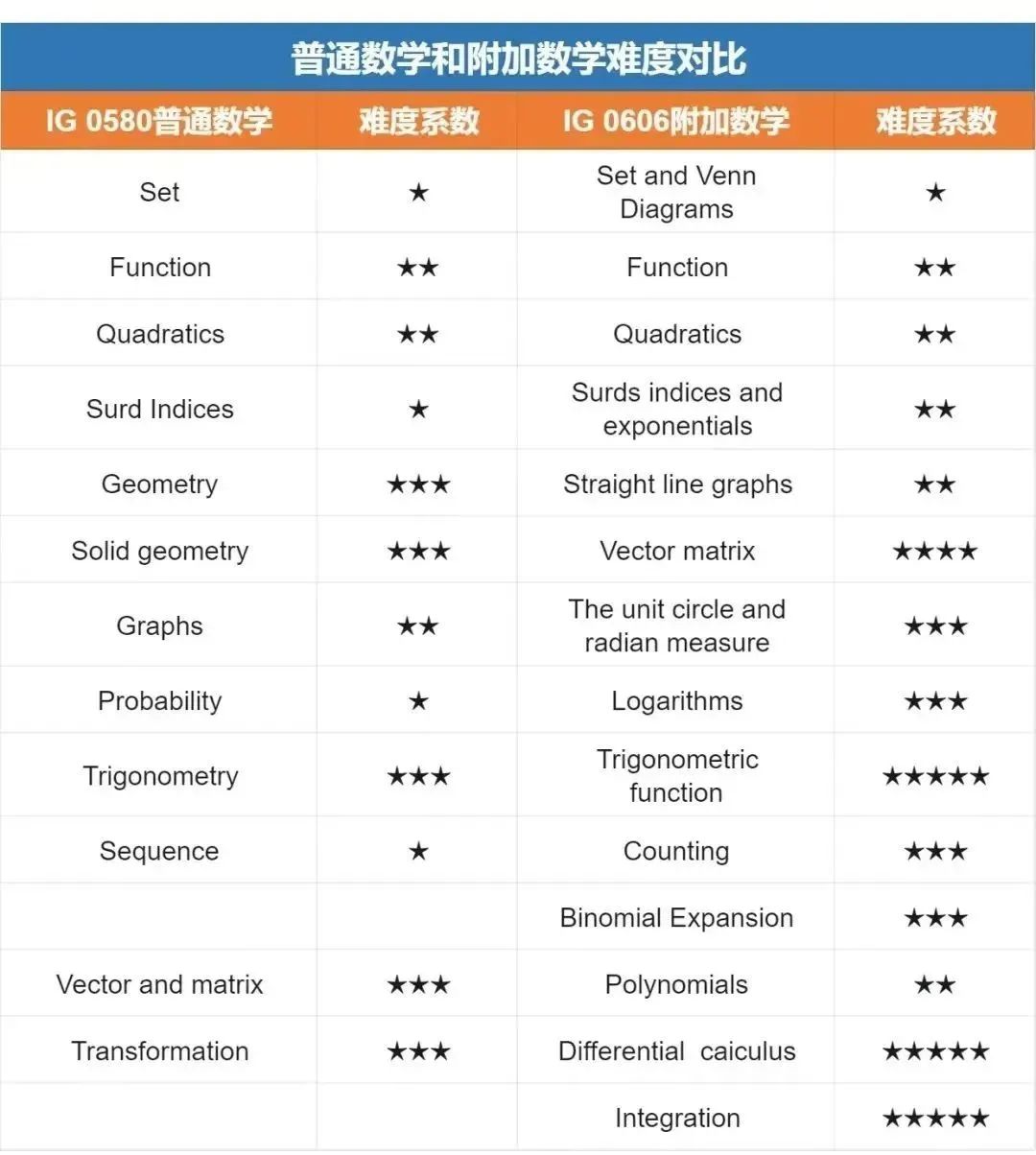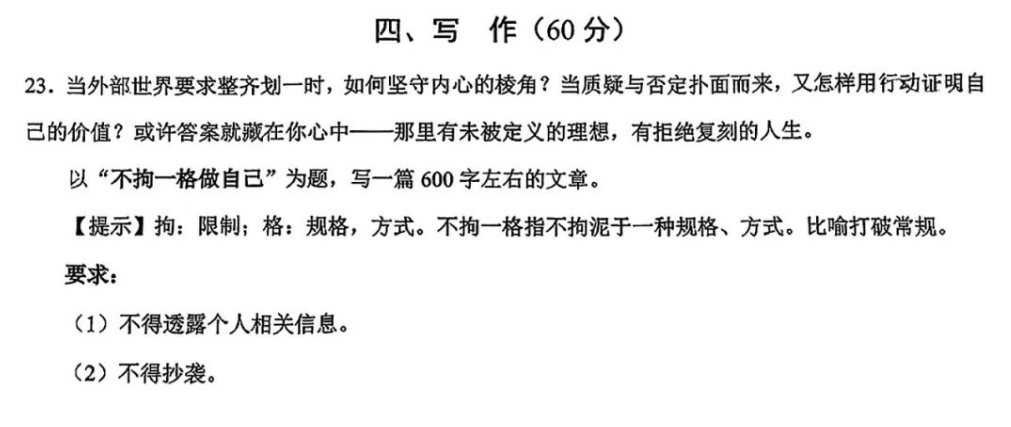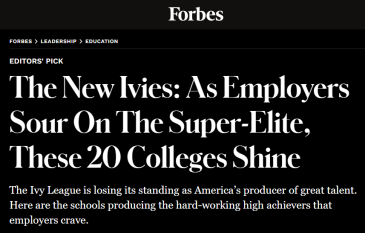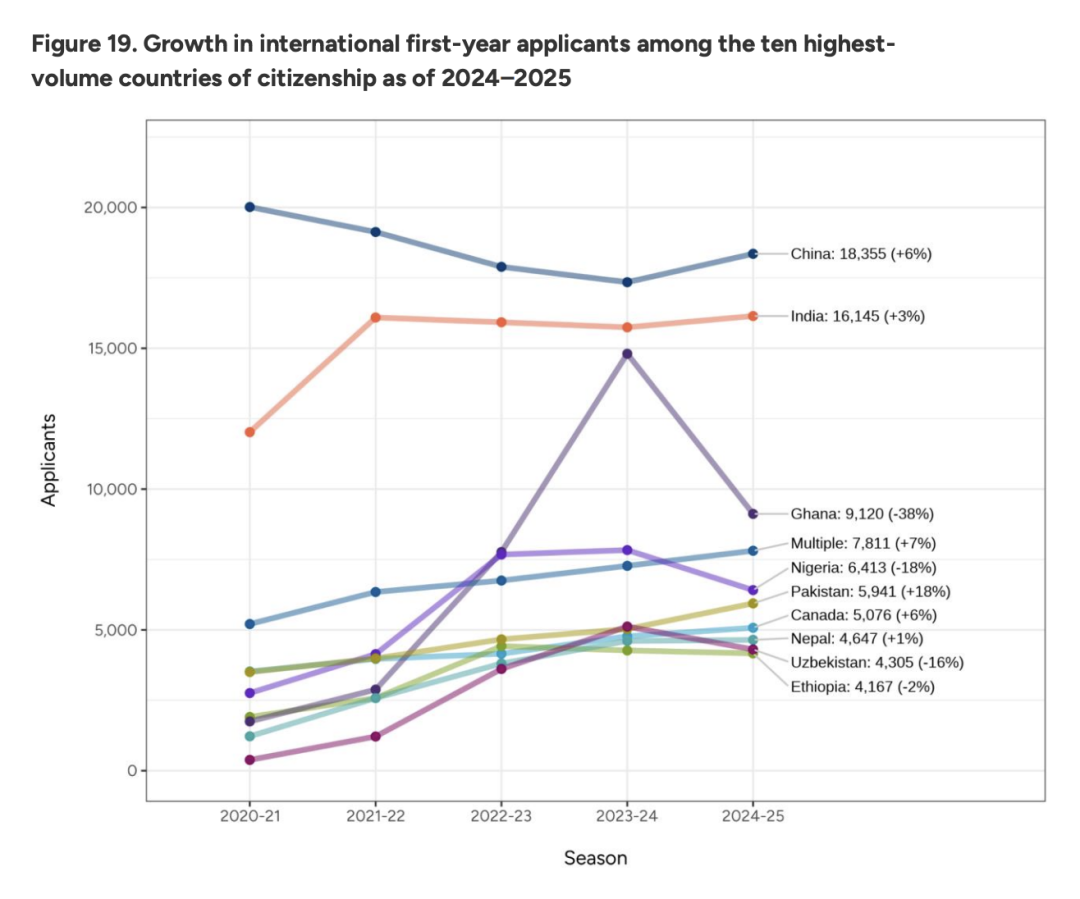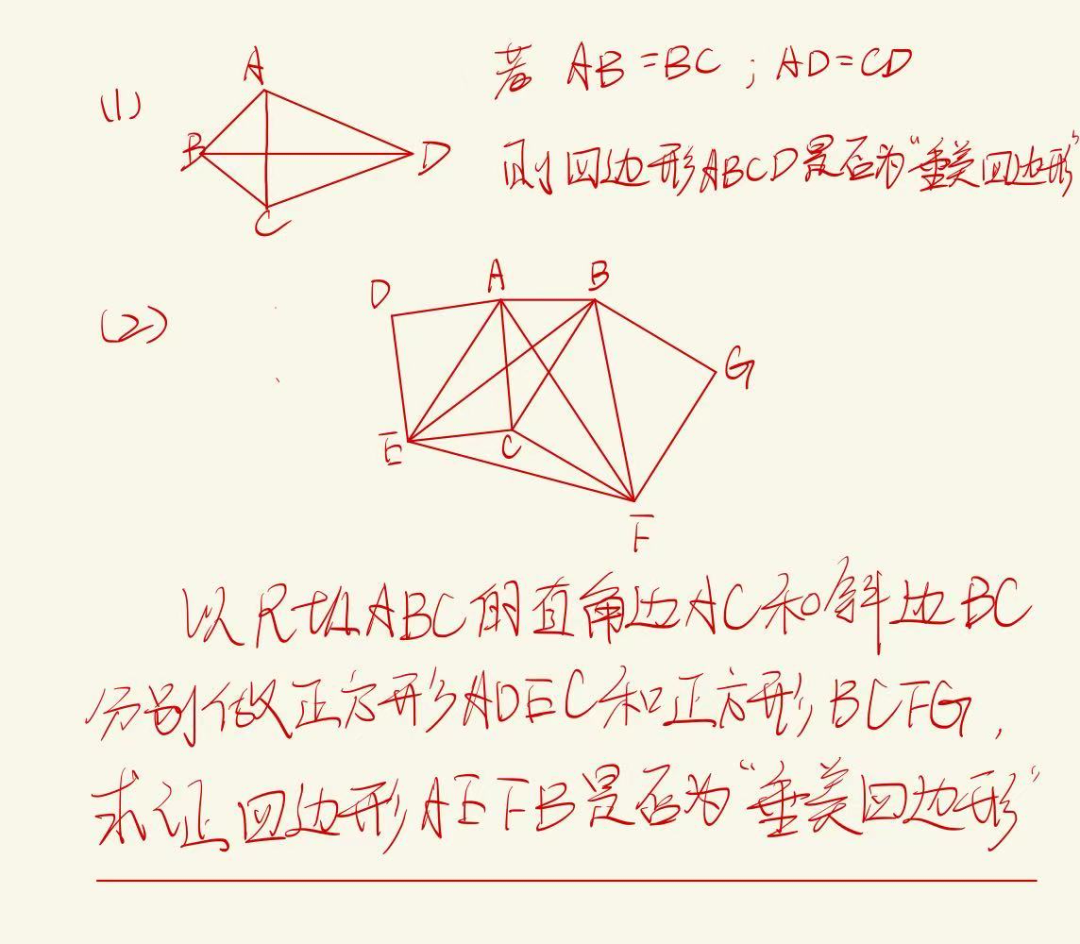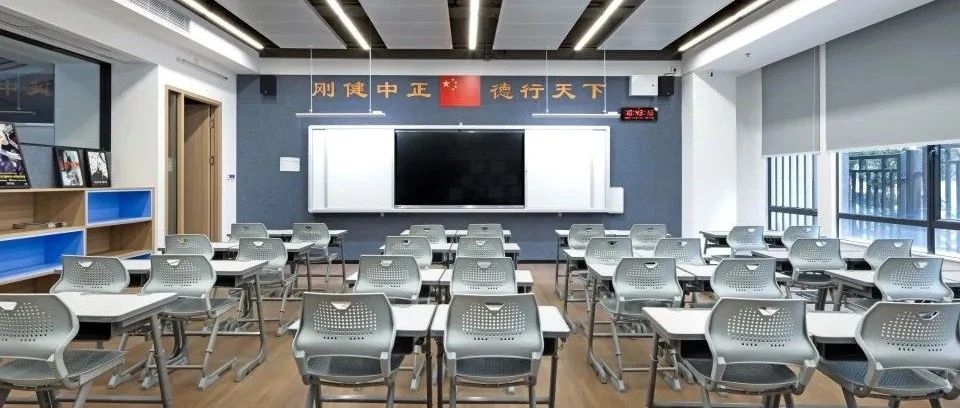从无名辩手到世界冠军需要几年?Robert用了11年。从12岁打第一场辩论时的意外和兴奋,到站在牛津舞台上,那一刻,他知道自己可以拿到冠军。
作为一个辩手,克服发言恐惧要几年?Robert同样用了11年。从他第一次站在赛场上遭遇发言时的结巴,到11年后真正的跨越内心的恐惧,只有他自己知道,即便你很有天分,也需要极大的勇气和努力才能够跨越鸿沟,实现梦想。
今年夏天,这位世界冠军将坐镇Junior WSD营地,今天就让我们一起来了解一下他辩论的精彩经历,以及对于辩论教学的真知灼见。
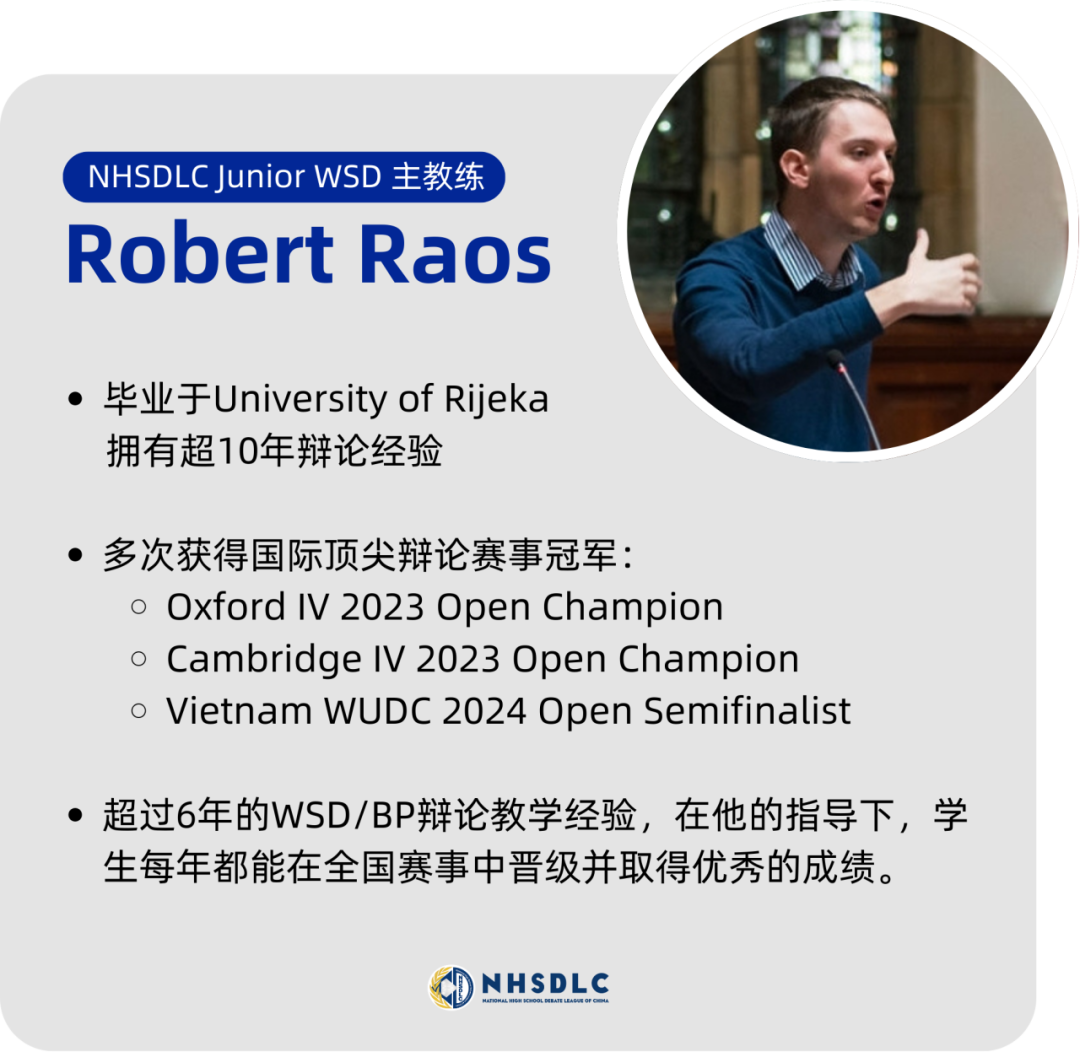
从小,Robert就展现出对于思辨的爱好,独自一人的时候,他非常乐于琢磨各种点子。用他自己的话说,
“I just love ideas.”
12岁时,老师注意到了他的天赋,Robert就这样走上了辩论的道路。从那时起,他就爱上了辩论:“中学时期我主要打WSD赛制,那时候我就知道自己很擅长辩论。那时候我甚至曾想象自己将来成为职业的辩论教练。”但受限于种种条件,初中和高中时期他并没有太多机会接受系统地辩论训练。
大学时,Robert选择成为一名哲学系的学生,这正是他熟悉且擅长的领域。“学习哲学让我有机会去探索人类思维的深处,我非常喜欢寻根问底,就像是剥洋葱一样层层深入进去,你不但可以知道是什么,还能知道为什么。”
直到现在,Robert依旧保持着阅读哲学书籍的习惯和爱好:“琢磨各种哲学命题真的是一件非常有趣的事情,尤其是当这些理论框架和基本概念和各种辩题联系起来的时候,你会更容易看到背后深层次的联系,面对各种论点的时候,也能够更容易地区分孰轻孰重(why arguments matter)。”
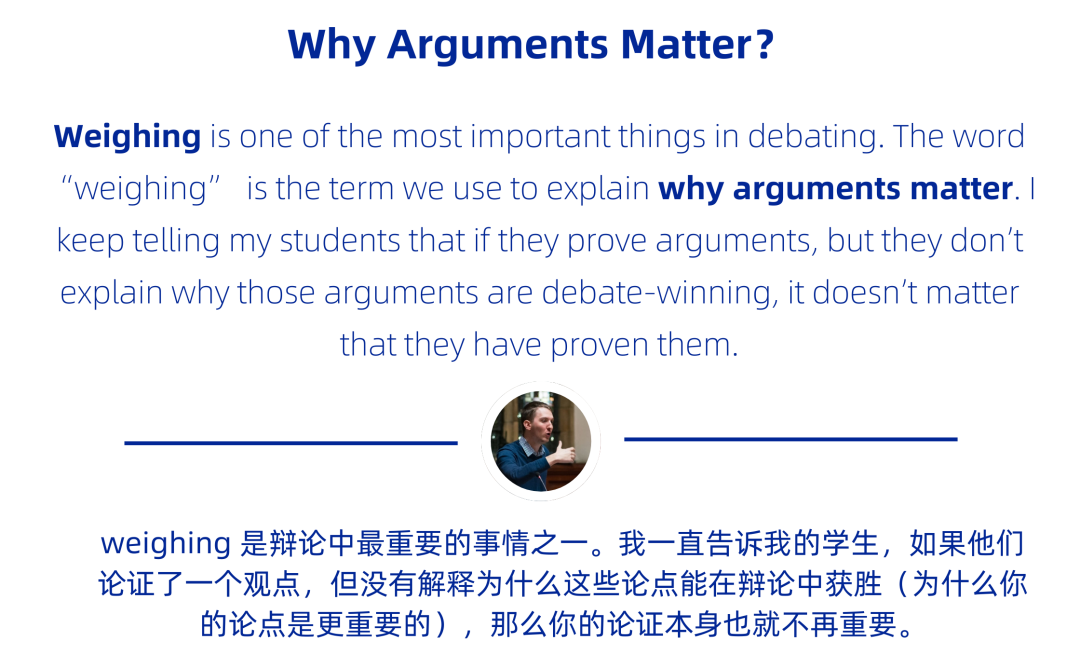
本科阶段时,受限于学校,Robert有3年的时间没有打辩论,但他的内心仍然对辩论充满向往:“我的内心其实一直在等待一个机会,我总感觉只要能够重新回到辩论界,我一定可以有所作为。”
机会总是给有准备的人,研究生阶段Robert也如愿加入了学校的辩论俱乐部(BP赛制)。但从没打过BP的他想要赶上队友的进度并不容易,那段时间他几乎每天都会花3个小时以上自学,在网上看了无数BP成熟辩手的视频,研究他们的风格和打法,也正是在这段时间的努力,真正奠定了他的辩论风格和基础。
很快,一年之后Robert就在荷兰的国际BP赛事上夺得冠军,这也是他第一次参与国际赛事。
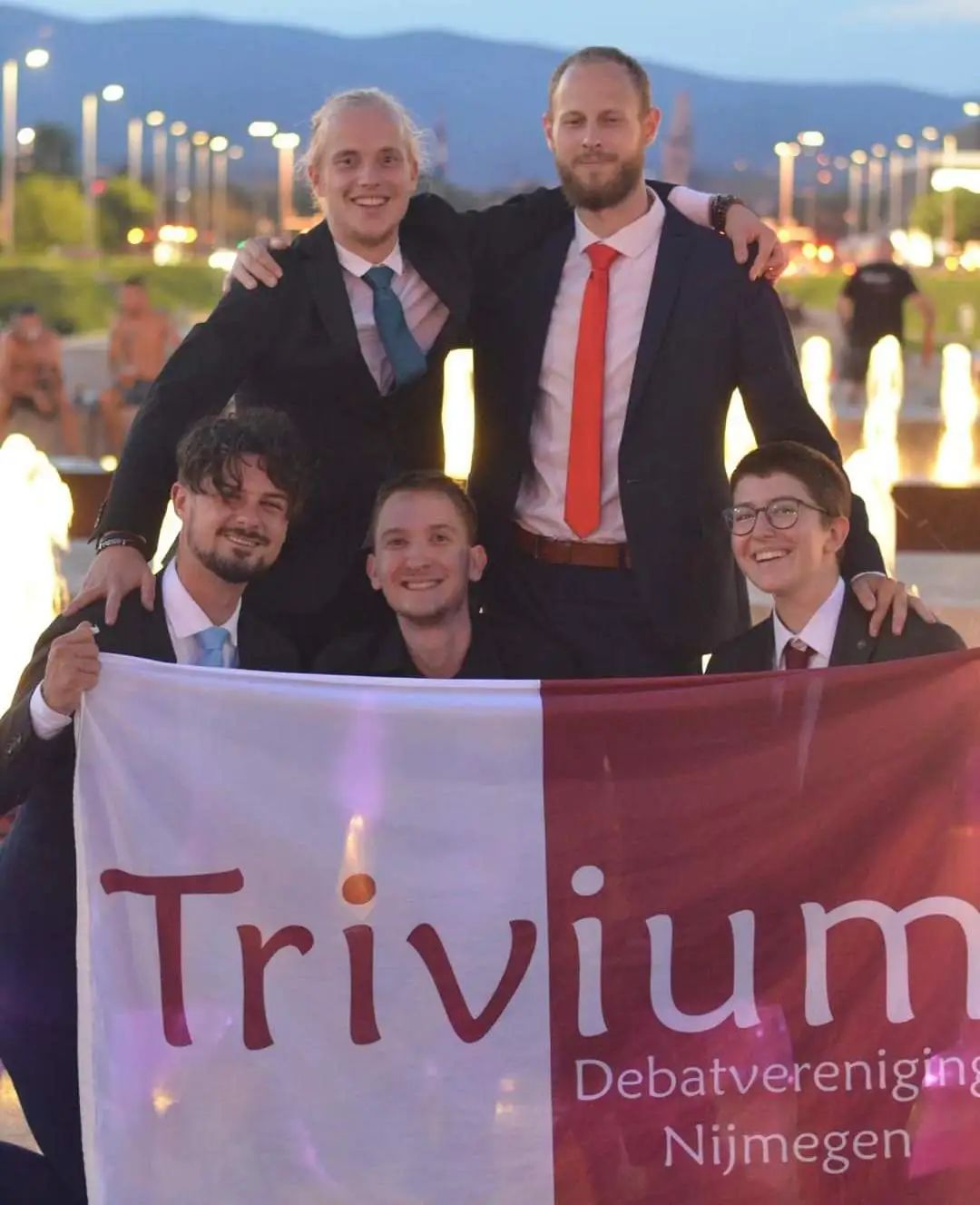
站在国际舞台和高手们切磋的过程让他难以忘怀:“这些比赛中我最大感触,就是所有这些参赛选手们,不管他们的教育背景如何,来自何处,只要他能站在这个舞台上,我们所有这些人都在同一个框架之下思维。
这是非常惊人的:这就好像是不管大家的文化背景、人格特性如何,我们某种程度上都在使用同一套大脑,同一套逻辑。在这样高度的共识之下,我们可以用一种高到异乎寻常的效率去交锋,跨越文化、性别、种族的种种隔阂,那是一件非常非常美妙的事情。”
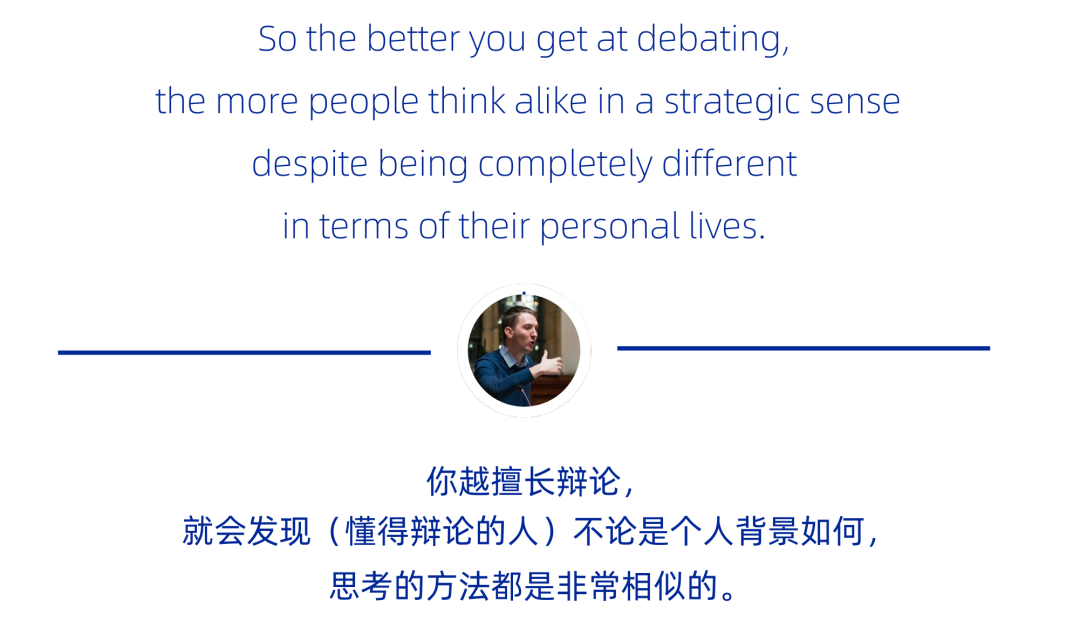
之后的连续三年,Robert和队友连续向素有“辩论界的奥林匹克”之称的WUDC发起冲击,并成功冲入半决赛。
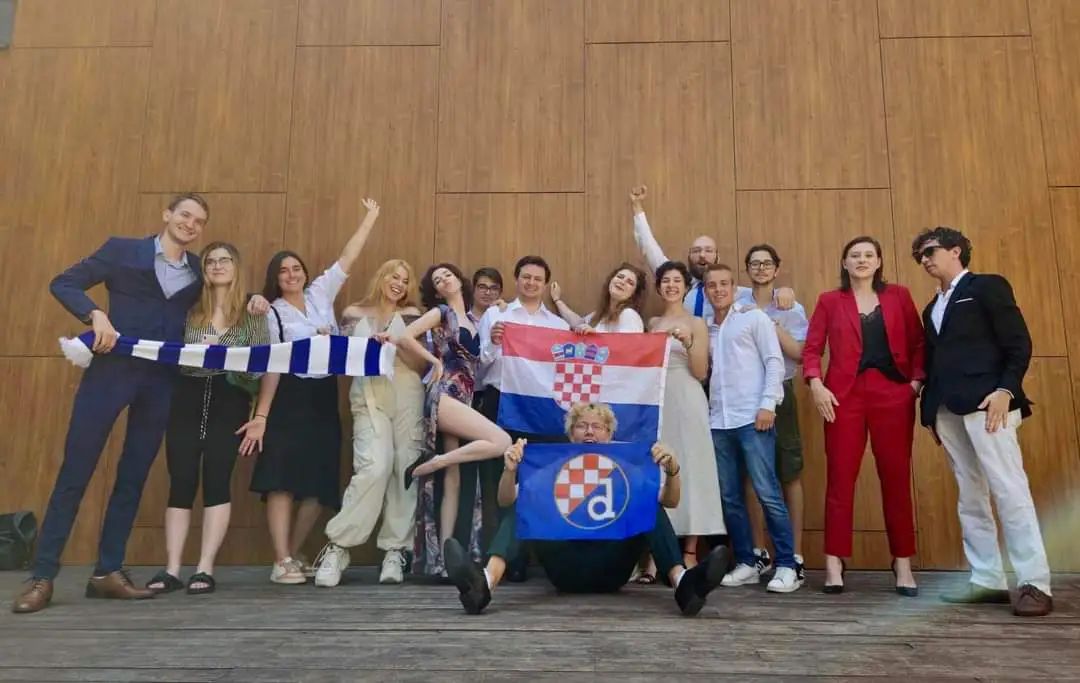
Robert(左一)和搭档们,他们共同经历了WUDC、牛津和剑桥辩论赛
作为世界上竞争最激烈的辩论赛事之一,WUDC几乎每一场比赛都令人印象深刻。
“我记得其中一场比赛,我们是下院。轮到上议院发言的时候,他们做了所有上院该做的事情,他们的发言简直无可挑剔。我听着上院精妙的发言,一面思考着如何扩展我方论点……这些都是比赛中我们需要做的再普通不过的事情,但是我忽然感觉到非常幸福:因为我有辩论这个爱好,我能够站在这里,做这些事情能够和这么优秀的人打比赛。”
那一场比赛Robert成功拿到第一名,上院的对手也因为出色表现排名第二。

当我们问到面对如此优秀的上院如何才能取胜时, “这时候你只要试着去做得更好。” Robert狡黠一笑,继续说到,“关于如何做一个优秀的下院辩手足够我们开一期讲座了(笑)。但简而言之,下院应该专注发现上院case的漏洞,并努力让整个论证变得更强,或者有更广泛的适用性;或者用一个全新的case去做一个更好的证明。那场比赛中我们采用了上院的case,但是更加深入地解释了其中的机制,让它能够适用于更广泛的群体。”
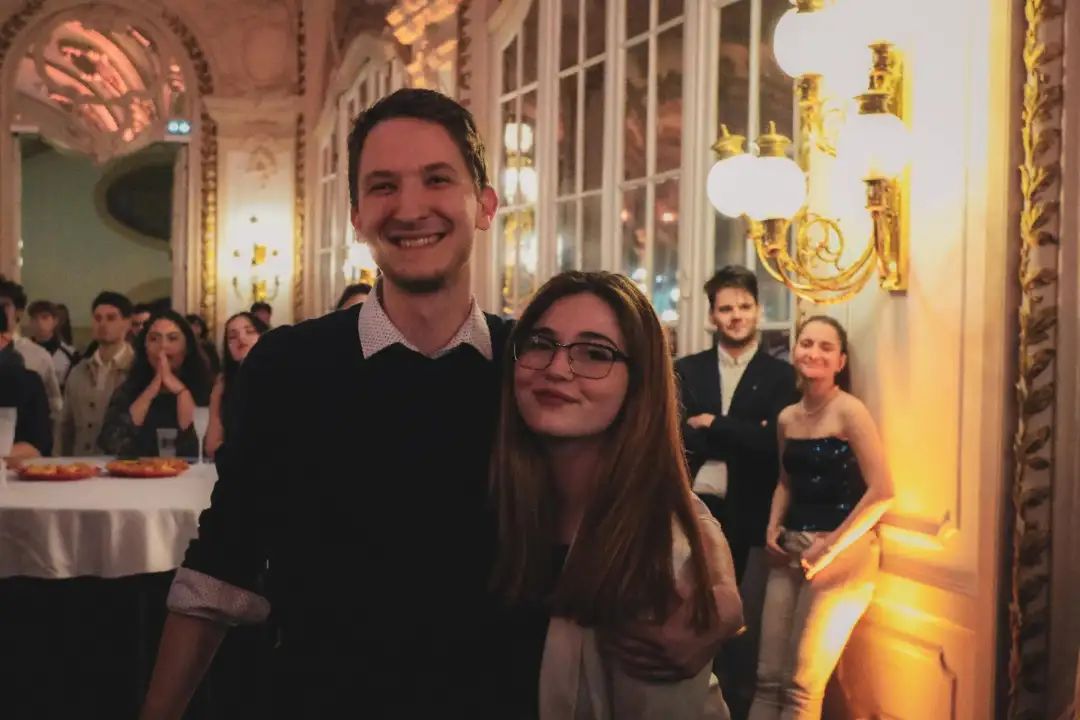
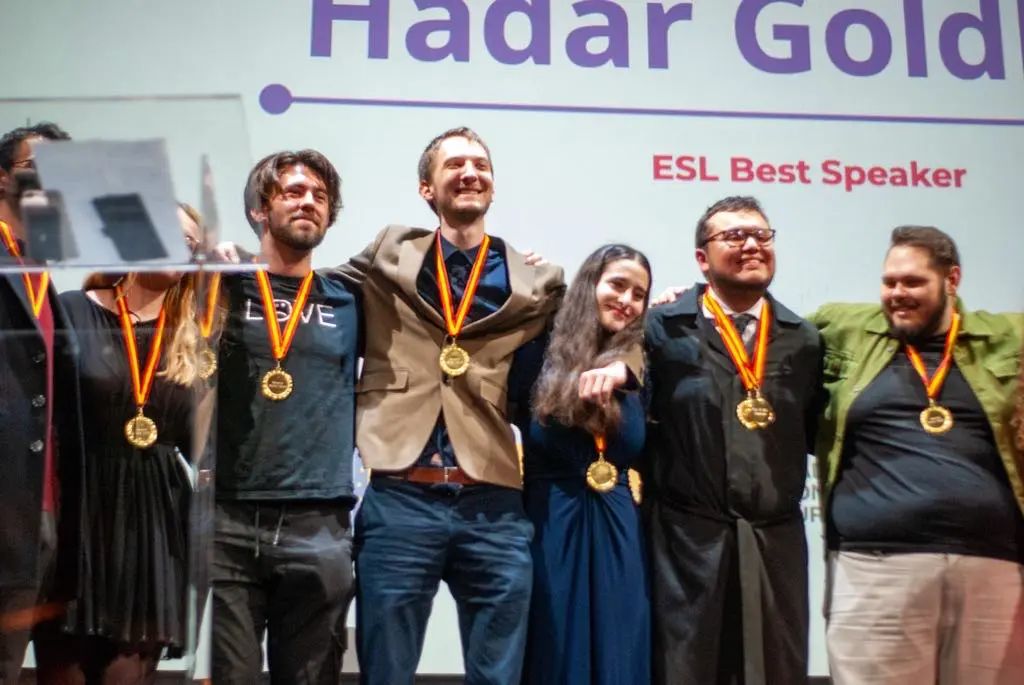
在今年,Robert又接连拿下牛津辩论赛和剑桥辩论赛的双料冠军。两个辩论赛和WUDC难度不相上下:很多世界顶级裁判都会执裁这三个比赛,同时,Robert也曾在牛津和剑桥辩论赛中遭遇熟悉的辩手,区别仅在于WUDC的参赛人数规模更大。在这两个世界顶级比赛中,Robert同样收获了非常珍贵的回忆。
“牛津的比赛真的很有意思,淘汰赛阶段的每一场对我来说都很特别。比如说1/4决赛的时候,我们碰到了一个中国相关的辩题,因为我有很多来自中国的学生,而且我也来过中国,所以那一场我的case写得特别快(笑)。到最后决赛的时候,我看到辩题的那一刻就有一种非常奇妙的感觉:我知道这个辩题该怎么打,而且我也知道我可以赢。然后我真的赢了。”
如果说牛津的经历像是冥冥之中的天意,剑桥的冠军更像是一次厚积薄发:
决赛时的辩题关于宗教, “很多年以来我脑子里一直有一个关于类似问题的机制,我一遍一遍地把它想了很久,但是一直没有碰到适合的辩题去打。那一场比赛恰好就是最适合它的,这种感觉真的很奇妙。”

牛津获得冠军后
然而, 优秀如Robert,也曾在辩论的道路上遭遇过宿命般的短板:
“其实我并不擅长做speech:从前一旦我开始紧张,或者要做很重要的speech时,我就会口吃。那种感觉就像是你完全瘫痪了,我根本无法把心中的想法顺畅地表达出来。这个困难从我12岁新手时期就伴随着我,多年来我一直努力地去克服,直到近年来我在国际赛事上取得了一系列成功时,我感觉自己真正跨越了这个障碍。这真的是一场漫长的旅程。”
“多年来我应对这种情况的方法是,我知道只要我有足够好的论点,只要我知道通往胜利的逻辑路径,演讲不完美也没关系,因为只要论据足够强大,只要逻辑站得住脚,听起来是否完美并不那么重要。而这一信念也让我在演讲时有更好地表现。”
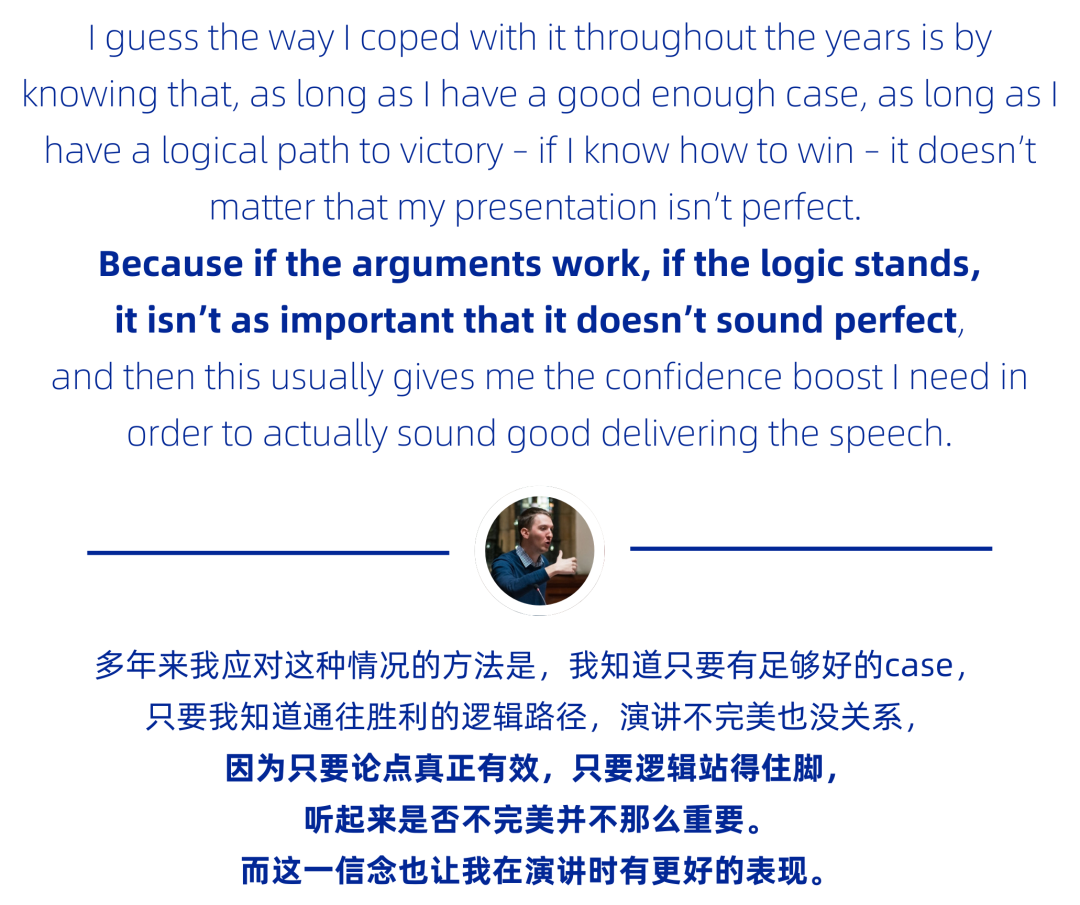
用十年的时间,他跨过了内心的恐惧,成为了年少时想要成为的人。其中的艰辛或并不足为外人道,而他的秘诀,或许可以从采访中的一句话窥见几分:
“Passion.Passion trumps everthing.”
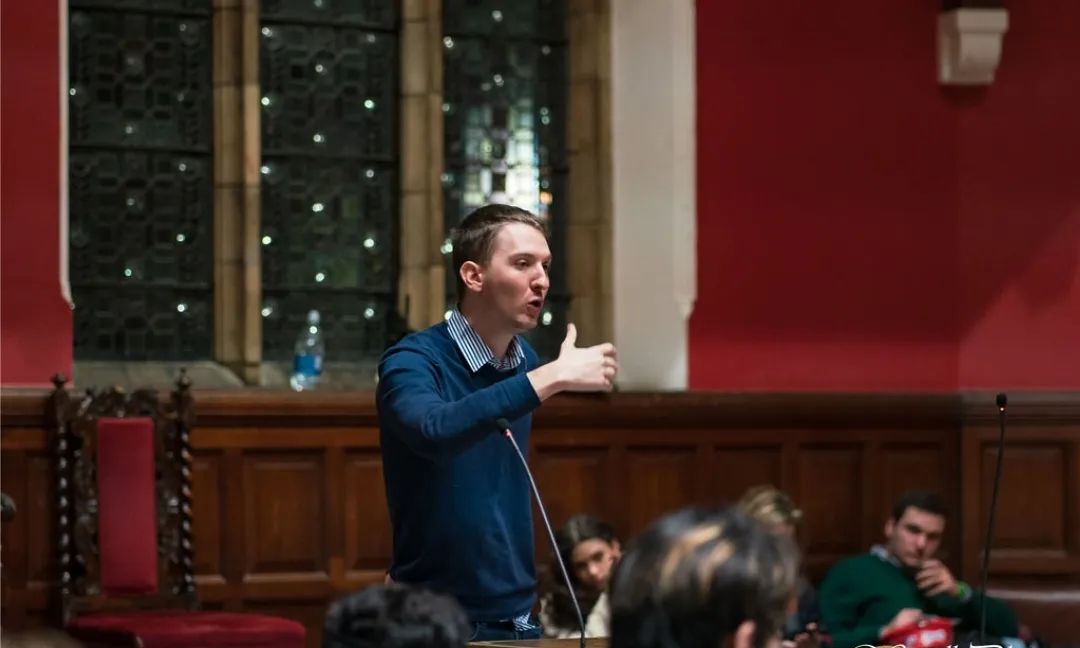
今年暑期,Robert将坐镇上海和北京,给热爱辩论的你带来前所未有的思想盛宴。作为一个10年顶尖辩手,他同样有着超6年的丰富教学经验,关于教学他又有哪些思考?这次我们也问了10个大家关心的问题:
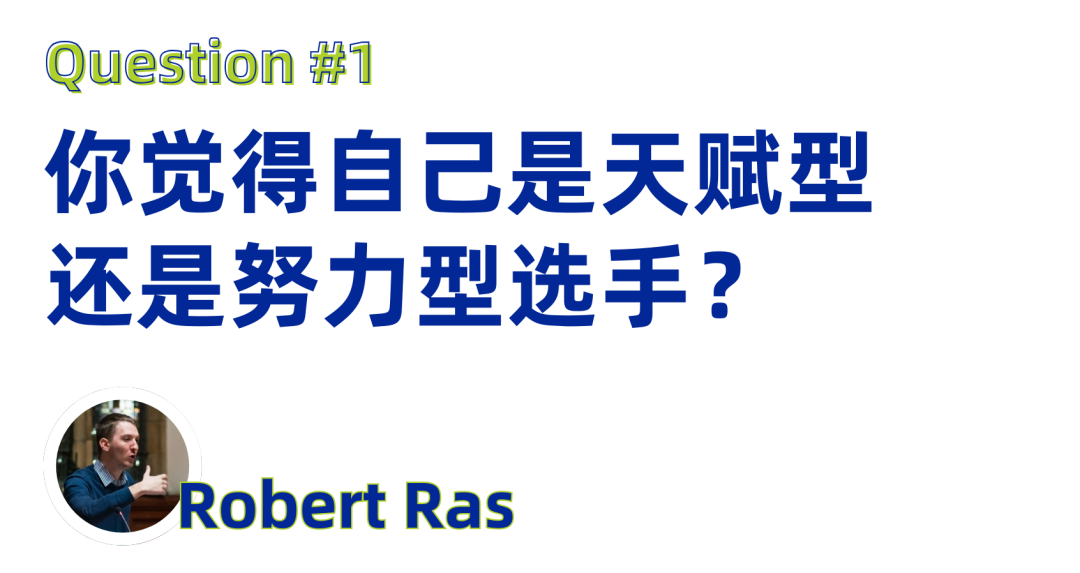
我觉得我是二者的结合。我想如果我们对一件事情缺少天分是很难走得很远的。但是天赋只是一部分,因为有天分的人其实很多,如果你不够努力的话,终究会被那些既有天分又非常努力的选手淘汰的。
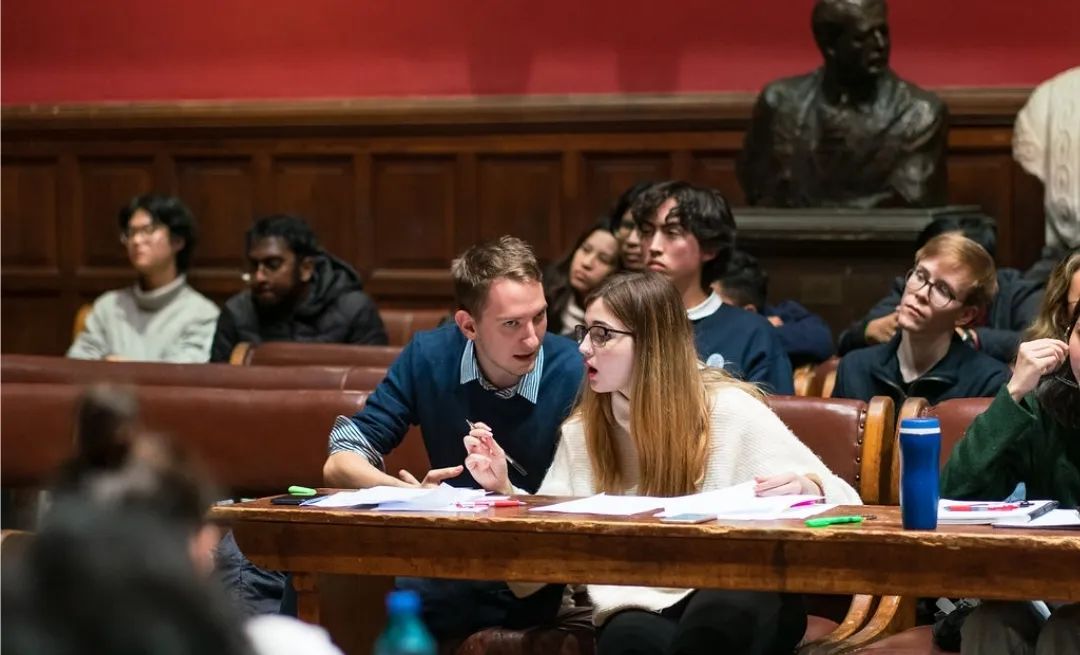
I think i'm a combination of both. I don't think you can really succeed at anything unless you do have some sort of an affinity for it. But then again, having an affinity for something is not enough because plenty of people have an affinity for all sorts of activities. But if you don't consistently train, you're going to be outcompeted by people who have an affinity for the thing and work hard – you need to have a combination of both in order to succeed.
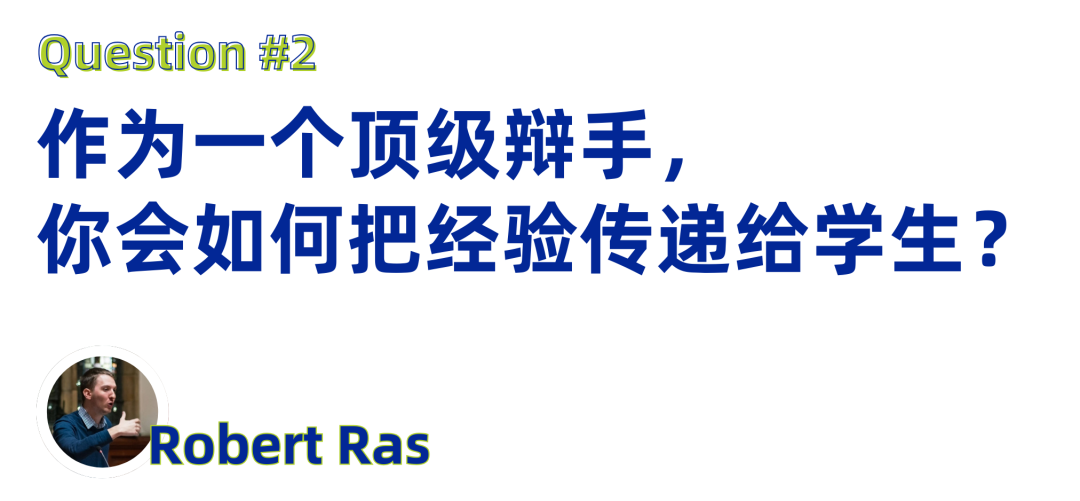
教学中我其实不太考虑自己的经验,而是更多的注重的是辩论中的核心元素有没有讲好清楚:比如说rebuttal、analysis、weighing等等。当然我自己的经验在我和学生一起解决问题的时候也许会发挥一些作用,但我想那并不是决定性的。重要的是能不能帮助学生解决具体的问题。每个学生都有属于自己的问题和困难要克服,也不是每个学生对于辩论都有同样的野心,他们也会有各自的目标。
对我来说更重要的是在做一个教练的时候,以学生的需求和目标为中心。每个学生都有他的独特之处,所以也需要我们去找到最适合每一个学生的教学内容与重点。比如说,有的学生可能在反驳方面很有天赋,但缺乏很好地组织演讲的能力。这样的学生需要与不知道如何有效反驳的学生截然不同的指导。前者需要练习表达,后者需要学习逻辑分析。
I don't really try to think of experiences necessarily. I just think about elements of debating, like rebuttal, like analysis, like weighing. And subconsciously i'm translating all of the experience I have in all of the debates, but the way my mind works is that I just focus on ideas, so I don't focus on experiences as much. I just take away the ideas from each experience and then hopefully this makes me more knowledgeable about how to prove mechanisms. Each student has unique problems, each student has unique goals, and they don't necessarily have the exact same ambitions or problems that I do. So I just try to focus on their specific situation and give them the best debating tips possible. I don't fixate on my own experiences and on how I did something. Each debate is different and each debater requires a different type of coaching. For example, a student might be talented at rebuttal but lack the discipline to structure speeches well. Such a student would require very different coaching from a student who doesn't know how to rebut efficiently. The former would need to practice delivery, the latter would need to work on logical analysis.
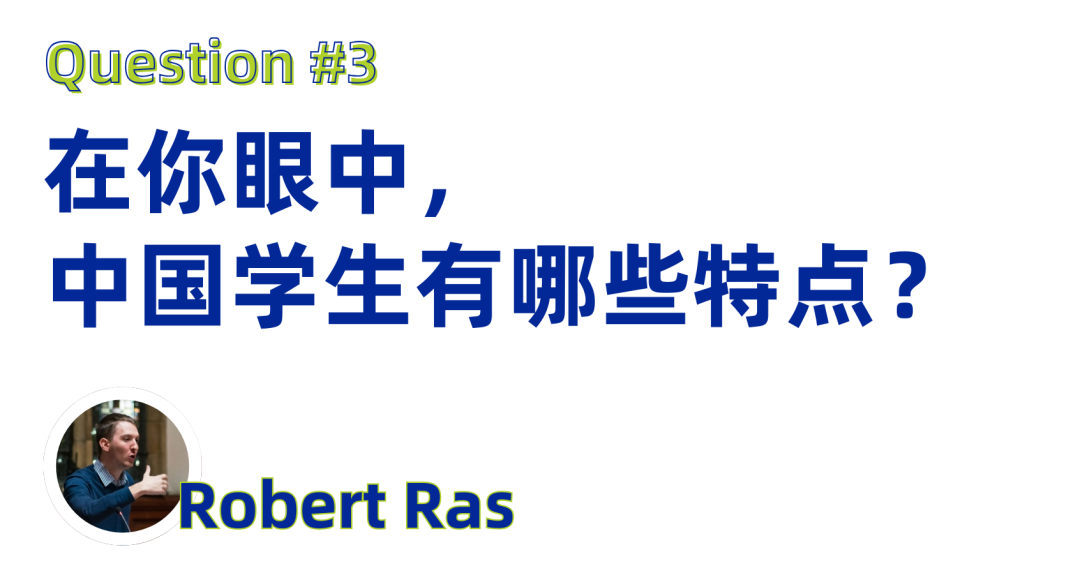
中国学生都非常勤奋。我来自一个在人们对于工作宽松得多的国家。在我的国家,人们没有努力工作的心态。这也有好的一面:在我的国家,人们很享受休息时间,因此人生态度大多比较松弛,也会更注重享乐而不是努力工作。
但中国学生更有纪律,甚至更有野心。我们那 15 岁年轻人大多想着自己又喜欢上谁了,在中国,学生真正关注的是学术成就,比如在比赛中表现出色或取得好成绩。所以中国学生很有竞争力,也很努力,我非常尊重他们。
Chinese students are exceptionally hard working. I come from a country that's a lot more relaxed in terms of how much people work. People don't have a hard-working mentality in my country which I think has some advantages. For example, in my country people really enjoy their time off and because of that have a very relaxed view of life and are focused on enjoying life more than they focus on working.
What I respect about Chinese students a lot is that they have discipline that the people from my country don't and maybe even an ambition that students from my country don't. Whereas 15-year-olds in my country mostly think about partying or who is their crush, in China students are really focused on certain academic achievements like being good at the competition or doing well in school. So chinese students are quite competitive and quite hard working and I respect that.
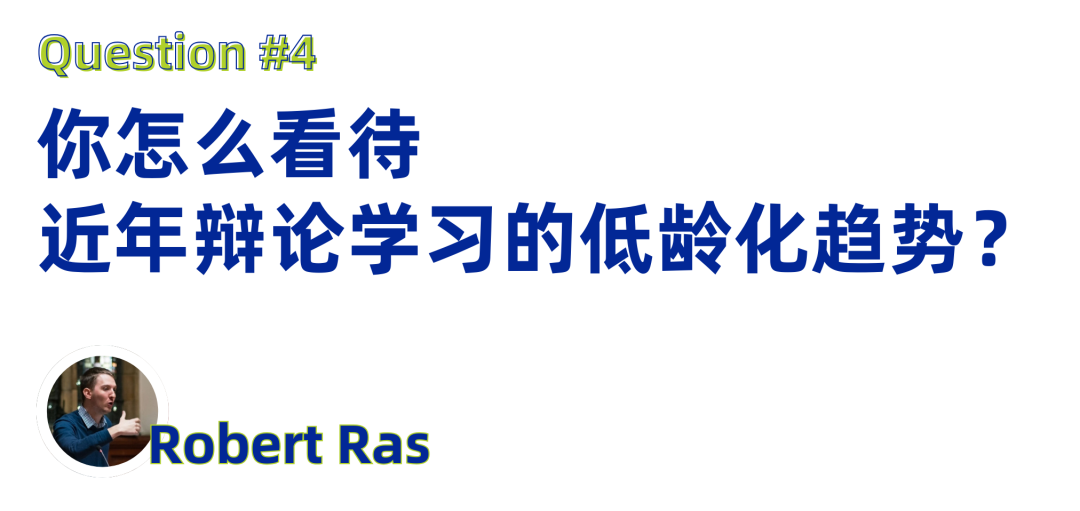
我觉得这是好事。学习辩论对于孩子的综合素养是非常有益的,因为想要学好辩论需要各种各样的技能:你需要是一个好的思考者、好的沟通者、也要有好的团队协作的能力和语言能力,这些都是不同维度的能力。从小接受这样综合性的训练是很有意义的。
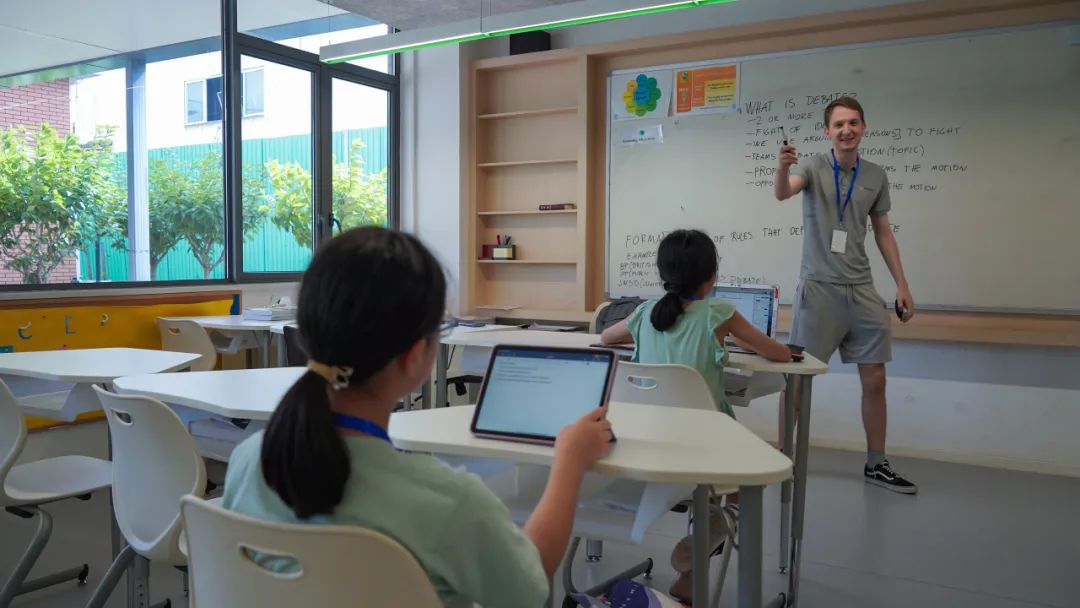
I think that's good. I think debating is an activity that's very helpful because you have to learn all sorts of different skills. To be a good debater, you have to be a good thinker, you have to be a good communicator, you have to have teamwork skills, you have to have good language skills. These are all different skills. And the good thing about debating is that students get to practice all of those. So you very much welcome younger students practicing debating.
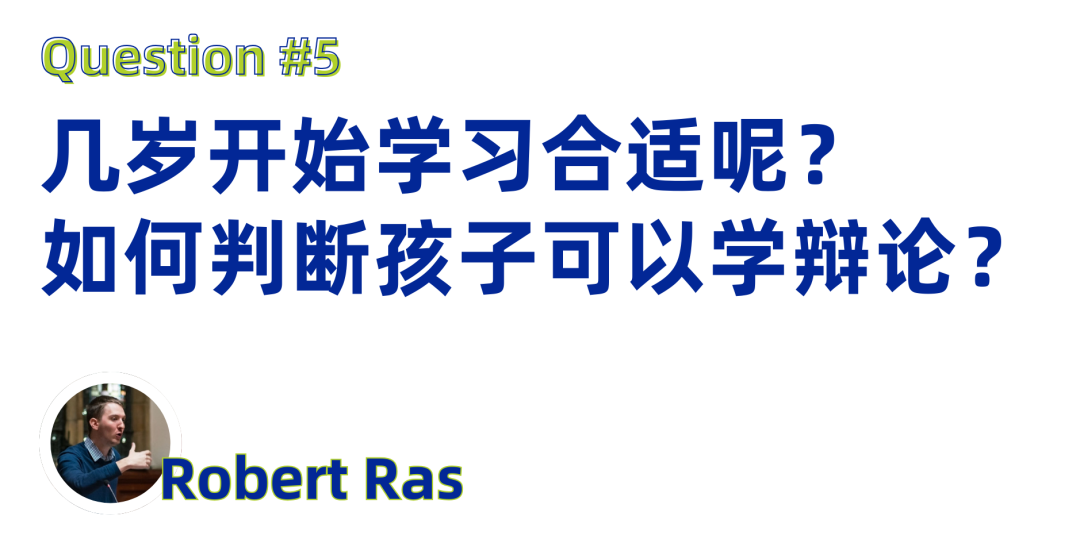
我觉得8岁左右开始也许是一个不错的时间。因为大部分孩子在这个时候学生知道 1、如何表达有意义的句子,并且足够清晰,可以做演讲。在这个基础上,2、意味着也学生初步懂得了逻辑,他们的大脑发育更加完善,能够在用不同的条件下运用逻辑;3、他们可以真正发表自己的想法,而不是重复网上听到的观点。总之,当一个孩子在面对陌生的话题和情景时,懂得有逻辑地思考,他就能够更加条理分明地辩论。
I would say maybe 8 years old,.Because at that point, students know how to construct sentences that make sense and that are articulate enough to actually construct a speech. And students have a grasp of logic at that point, their brains have developed more, so they can employ logical reasoning in new situations, which means that the type of debating they can do is not just the type where they repeat a speech they hear online. But they can actually think logically about new topics and about new situations which just makes them able to engage in debate on a more constructive level.
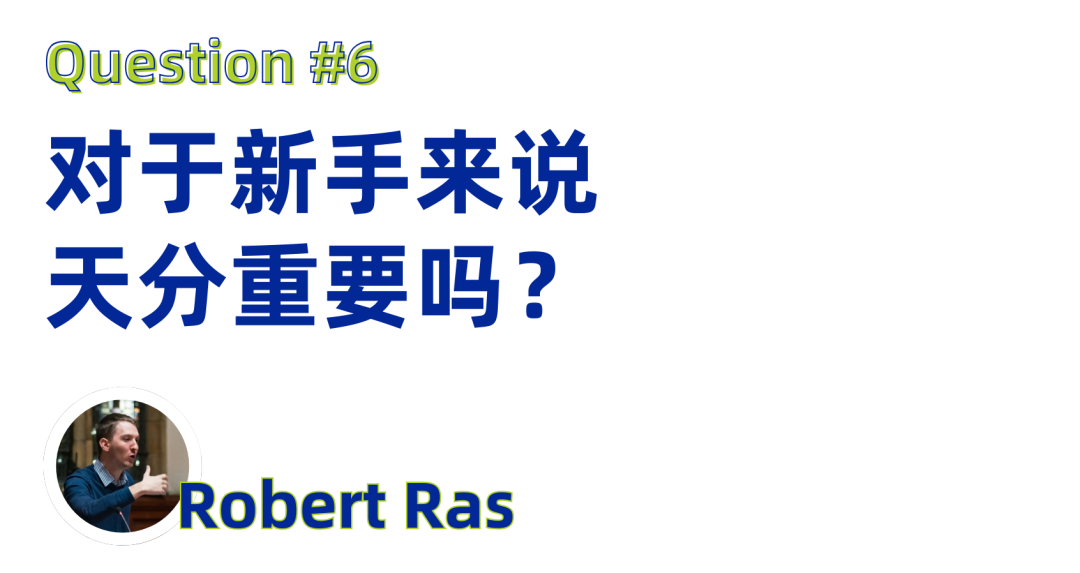
如果你想成为顶尖的辩手,天赋很重要。但是学习辩论本身并不需要多少天分,而不管你天赋高低,都可以从辩论中获得很多好处。
Talent is important if you want to be the best at debate, but even if you don't have extreme talent, it's still very beneficial for you to learn debate and you don't need talent to learn debate.
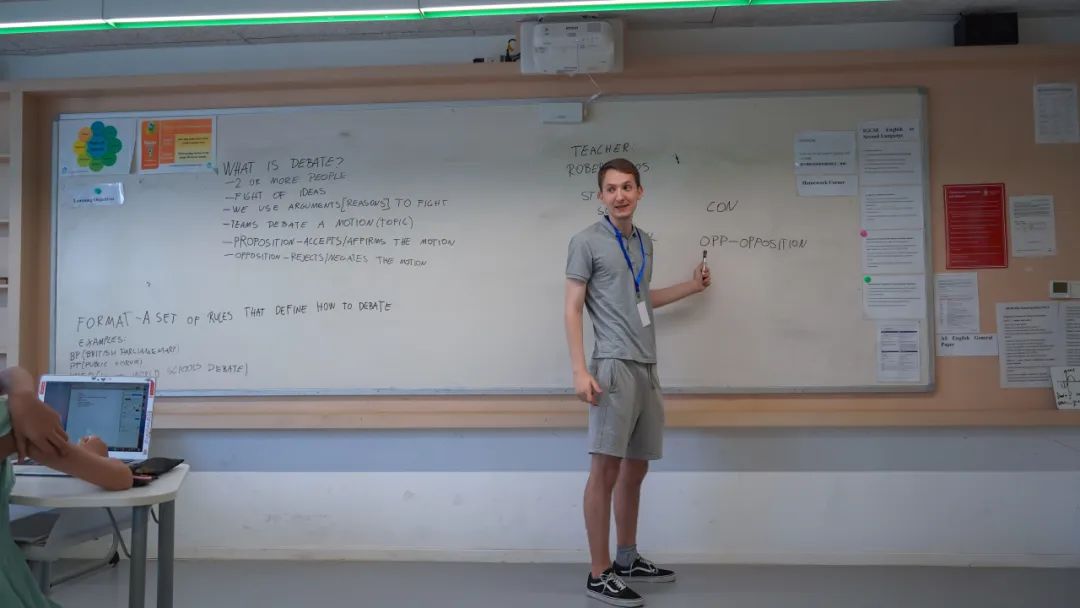
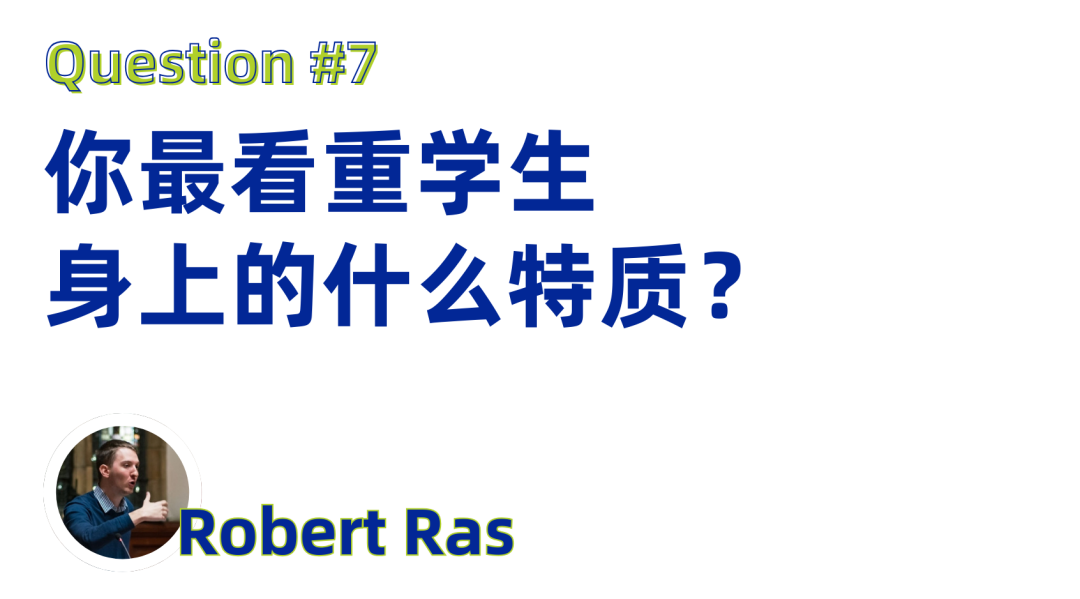
热情。我觉得热情的重要性胜过一切。我非常擅长和关心某一辩题的学生一起工作,如果学生已经真正参与辩论并想成为优秀的辩手,无疑我们在一条船上。我可以帮助有热情的学生成为他们想成为的最好的辩手,这是我的强项。
有热情的学生愿意克服任何障碍去获胜。这些学生通常常问我一些策略的问题,比如framing。我感觉让学生对赛制的每一个技术细节都如数家珍,以便在比赛中取得胜利,总是一件非常有趣的事情。
Passion. Passion trumps everything. If someone is passionate about something they want to do, this is the most important factor, definitely passion.
I am very good at working with students who already care about the topic. If students are already really involved in debating and want to be good debaters then I am on the board with them. I can help them become the best debater they want to be.
But what I think I am the best at as a teacher is taking the students who want to learn and then taking them to the next level. That's what I think is my strength here.
Students who are passionate about the sport are willing to overcome any obstacle to win. These students typically ask me questions about advanced strategies, such as framing, so it's always fun to nerd out about every single technicality and detail about the format that the student can use to squeeze out a victory at a tournament.
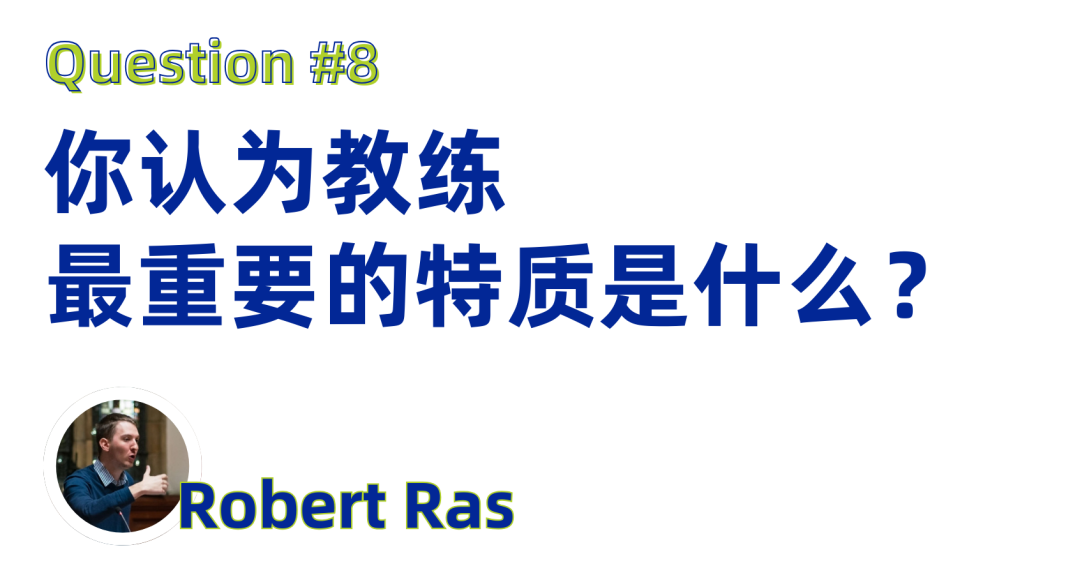
耐心和沟通技巧。我认为教练必须了解和儿童沟通的语言和成年人是不同的,和孩子沟通也需要更多的耐心。
你知道成年人和孩子在沟通方面的不同是什么吗?
和孩子沟通,一定要记住不能理解非常复杂的词汇和逻辑,而这对于习惯复杂表达的辩手来说尤其需要注意。同时教练一定要记住,要能够把复杂的东西简单化,因为孩子的认知还未发展完全。
永远都要记住孩子的大脑是未完全发育的。一定要从最基础的概念开始和孩子交流,不要从一些非常复杂抽象的假设出发。这样就能和孩子有一个好的交流。
Patience and communication skills. And for that, you need to understand what sort of language children are responsive to – so clear communication skills. This and patience I think are the two most important things if you want to become a debate coach with kids.
What is the difference in communication with kids and adults?
With kids you have to take into account that they don't understand complicated words, which is something debaters need to take note of because debaters use a lot of complicated words. And you have to take note of the fact that you have to break things down in more simple terms because kids’ brains aren't fully developed.
You can't start with the assumption that they know some things. You have to start from the ground up, start from the basics. This is how you approach communicating with students.
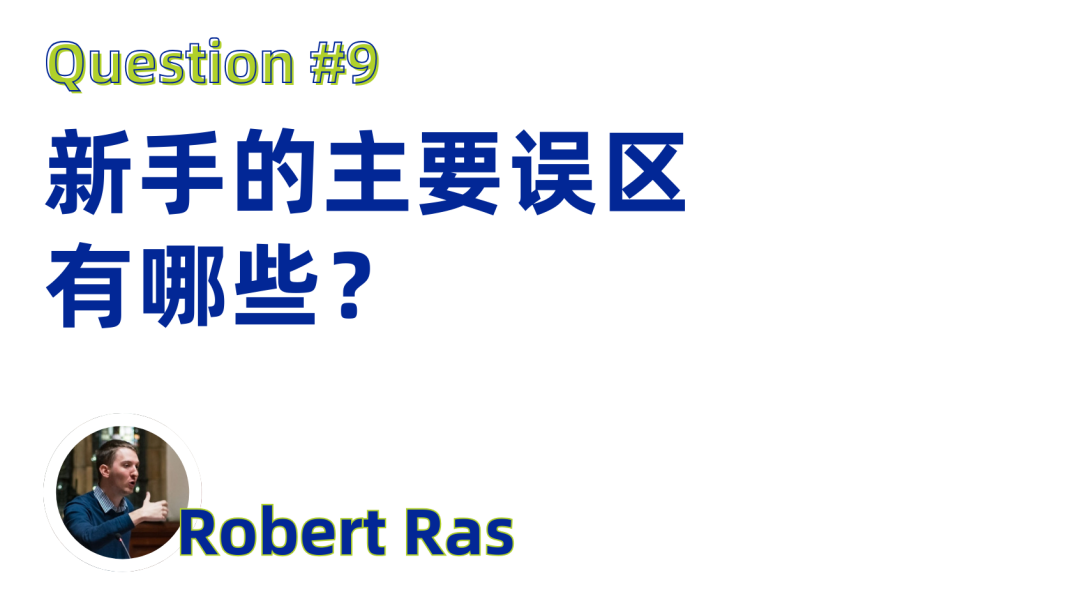
学生们通常认为,要想在Junior WSD中获胜,你需要有非常具体的统计数据和论据,但这其实不必需。在Junior WSD中,你需要做的事情是:有一个合乎逻辑的理由,能够说清楚事情的内在机制,有一整套让论点成立的逻辑链。但你不需要拿出哈佛大学的研究报告什么的来赢得辩论。
有一个好的例子会让你的论点更有说服力,这是很好的,但从根本上说,Junior WSD主要关心的还是逻辑问题。
Students often think you need to have very specific statistical evidence and very specific examples to win a debate. They believe you provide evidence for your claims, which is actually something that is not necessary. In Junior World Schools, you need to have logical reasons, you need to have mechanisms, you need to have a logic of how your argument works. You don't need to have statistical evidence. You don't need to pull out a study from Harvard University or something to win a debate.
It's nice to have. It makes your argument stronger when you have a good example, but fundamentally it's mostly about logic in Junior World School.
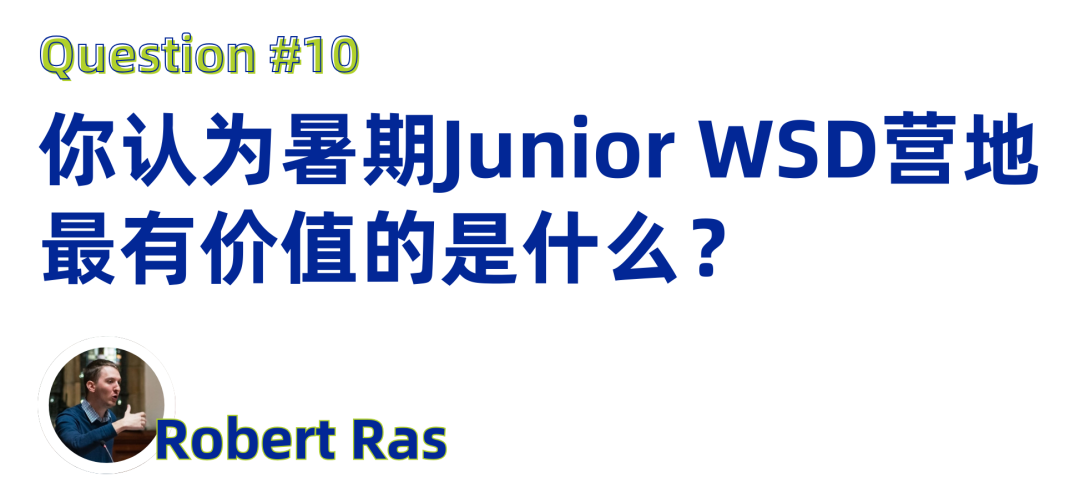
这真是一个好问题。这些夏令营可以让你在连续7-8天或更长的时间里完全沉浸在辩论的世界里,这和每周学2小时辩论是完全不一样的经历。
在训练营里,你的周围都是热爱辩论的学生。你总是和你的教练在一起,他非常了解辩论。你每天都在练习辩论,每堂课都在教学,每堂课都在学习辩论的新知识,这意味着你获得的经验比一周上2小时辩论课要全面得多,因为(如果只是一周一次课)你很可能已经忘了之前学到的东西。
当你长时间浸泡在辩论中时,就会开始内化知识。这才是更深层次的收获。这一点非常重要。因为这样一来,这些知识就会伴随我们更长的时间,即使过了两三年,也不会忘记,因为这是一个完整的经历,而不仅仅是你上过的众多课程中的一门课。
That's a really good question. These summer camps allow you to completely get immersed in the world of debating for seven consecutive days or eight or however many there are, which is different to other forms of debate practice where you only get 2 hours of debating at a time.
When you're actually at the camp, you are surrounded by other students who love debating. You're always by your coach who knows a lot about debating. You are practicing debating every single day and you're learning new things about debating every single class, which means that you get a lot more comprehensive of an experience compared to just going to debate classes once a week, because then you forget what you learn.
But when you actually are in this environment for a prolonged period of time, that's when you get to acquire knowledge. That's a lot of deeper.
This is very important because then this knowledge sticks with you for a longer time. You get to remember it even after 2 or 3 years, because it's an entire experience rather than just one class in a sea of many classes you have.





